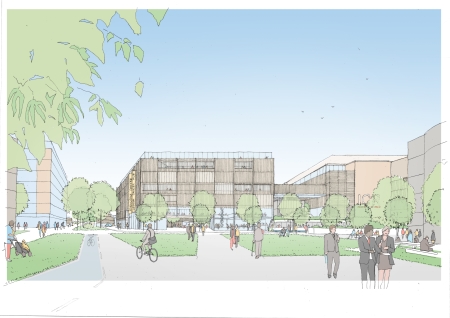Plans have been unveiled for a new global hub for cancer research and treatment in London.
Aimed at aiding the discovery of new treatments, if approved the London Cancer Hub would become a world-leading life science campus, specialising in cancer research, treatment, education and enterprise.
Located in Sutton, south London, it would potentially deliver at least two new cancer drugs every five years and will create more than 13,000 jobs.
Bringing together more than 10,000 scientists, clinical and support staff, it would also offer research and development space for biotech, pharma and software suppliers and equipment manufacturers.
A partnership between the Institute of Cancer Research (ICR) and the London Borough of Sutton, with support from the Royal Marsden NHS Foundation Trust, Epsom and St Helier University Hospitals NHS Trust, and the Greater London Authority; the building itself will be around 265,000sq m and will be surrounded by a large amount of green space.
A spokesman said: “We plan to deliver an exceptional environment for cancer research that enhances the discovery of new treatments and their development for patients.
“The London Cancer Hub will be a living, breathing community with research buildings, hospital facilities, a school, restaurants, cafes and hotel accommodation.
“The transformational design has the potential to deliver modern facilities in beautiful green space, making the most of the campus’s unique location within London.
“The campus will provide attractive work and leisure space for researchers and clinicians, and an outstanding healing environment for patients.”
Designed by Haptic Architects and Nordic - Office of Architecture, in partnership with JLL and WSP, the £1billion scheme is one of the most-significant projects in London and will form one of three life science districts planned for the capital, alongside the White City Campus and the Euston Corridor – a ‘golden triangle’ of life science expertise. It is expected to contribute around £1.1billion a year to the UK economy.
The spokesman said: “The ICR and the Royal Marsden face strong competition for talent, resources and patients, and in seeking to stay ahead of the game they are constrained by their current capacity and facilities.
“Rather than simply adding to the existing real estate, there is an opportunity for a much-more-fundamental rethink of the whole Sutton site.
“The London Cancer Hub will aim to deliver a world-class environment for cancer research and treatment capable of sustaining and building upon its international reputation.”
The ground floors of the proposed new buildings will be public spaces, with cafes, restaurants and leisure facilities. Rather than the more-sterile atmosphere of a traditional science or business park, they are being designed with a more-urban feel in mind. Some buildings will also house high-quality patient hotels where outpatients from the Royal Marsden can stay with their families.
Fundamental to the success of the scheme is the ability to attract a new network of commercial enterprises. The buildings will therefore be designed to house incubator laboratory space for spinout companies.
It is expected the scheme will take 20 years to deliver, with the first phase of work being completed by 2019.

